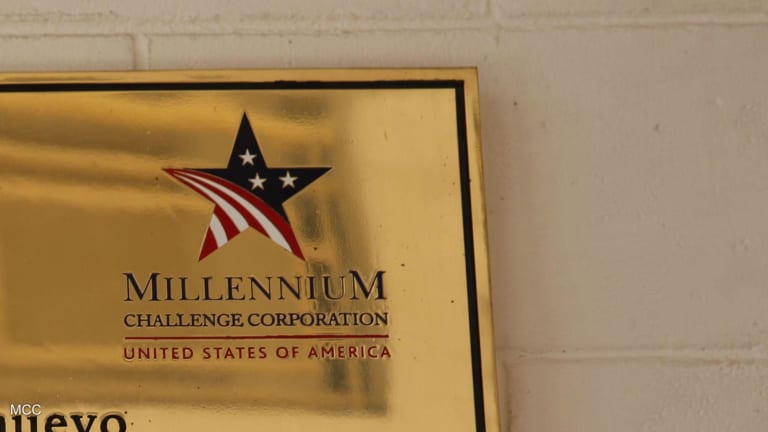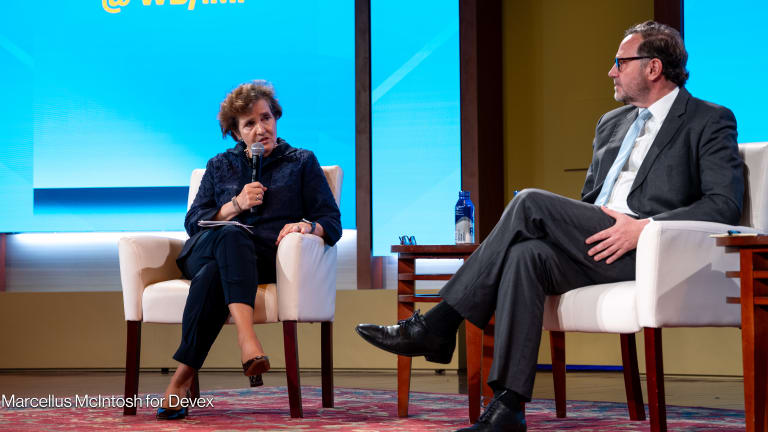MCC in numbers: The grants, countries, and programs at stake
As the Millennium Challenge Corporation faces an uncertain future, we dive into the agency’s $18 billion portfolio — exploring which programs, grants, and countries could be most impacted.
The Millennium Challenge Corporation — a U.S. development agency known for its data-driven approach to foreign aid — is facing a dramatic reckoning. Following the dismantling of the U.S. Agency for International Development, an internal email seen by Devex suggests MCC could be next. Staff were recently offered early retirement or deferred resignation packages, and sources say that preparations are underway to cancel contracts and begin winding down active programs. While no public announcement has been made, the signs point toward a dramatic downsizing — or even full closure — of the 21-year-old agency. That raises a critical question: What’s at stake? Since its founding in 2004, MCC has budgeted more than $18.4 billion across 92 programs in 51 countries — according to MCC’s website data (including 10 programs still in development without dollar values) — all aimed at reducing poverty through economic growth. Its hallmark is the compact: a five-year grant agreement with a partner country that requires them to meet strict governance and policy performance criteria. These compacts fund large-scale infrastructure, education, land reform, and energy projects — often contingent on countries making complementary policy reforms. MCC also funds smaller “threshold programs” designed to help countries qualify for future compacts, and since 2018, has launched a handful of regional compacts to promote cross-border integration and trade. Who has benefited most? Over two decades, five countries stand out as top recipients: Indonesia with $1.3 billion, Morocco with $1.2 billion, Senegal and Mozambique with $1 billion each, and Burkina Faso with $943 million. Today, more than 60% of MCC’s 92 programs are closed, 14% are in the process of implementation, and 11% remain in development, meaning they are still at the negotiation or preparation stage, and budget amounts are still unknown. Meanwhile, 8% are signed and 4% were terminated or discontinued — mostly due to changes in the democratic indicators. What’s in the pipeline? According to MCC’s website, 10 proposed programs are under development in Albania, Cabo Verde, Côte d’Ivoire, Gambia, Liberia, the Philippines, Senegal, Tanzania, Togo, and Tunisia. The latter one appears in development status, but it was approved by the MCC board in 2021 with a budget of $498.7 million; however, compact signing remains on hold until the government of Tunisia makes significant progress toward democratic governance. According to the latest news, these projects are likely to be shelved entirely as staff were told that any agreements not yet operational would be stopped immediately. Meanwhile, signed programs in countries such as Belize, Benin, Mauritania, Mozambique, Sierra Leone, Timor-Leste, and Zambia, totaling $2.2 billion, face an uncertain future, and the $3.6 billion allocated to programs already in implementation might still see some activities carry on till they are wound down. A lean agency with global footprint MCC was often held up as a model of bipartisan, performance-based aid. It partnered only with countries that passed a transparent “scorecard” of 20 governance indicators and was known for canceling grants when standards weren’t met. In recent years, it positioned itself as a tool to counter Chinese influence through strategic infrastructure investments. Unlike USAID, MCC had a lean staff of around 300 people and a relatively small annual budget of $900 million — though recent U.S. government data show that $2.69 billion in budgetary resources were available for MCC in FY2025. So far, only $163.24 million in obligations (approximately 7% of the overall budgetary resources) had been made, with about $105 million committed to program awards, according to USAspending.gov. What comes next? At the time of publication, no formal public announcement has been made about MCC’s future. The agency’s board, chaired by Secretary of State Marco Rubio, is expected to meet soon, sources have told Devex. Sources also say DOGE — the newly created Department of Government Efficiency — may be drafting a resolution that would potentially wind down all MCC programs. Staff were reportedly told not to expect a reversal. Try out Devex Pro Funding today with a free five-day trial, and explore funding opportunities from over 850 sources in addition to our analysis and news content.
The Millennium Challenge Corporation — a U.S. development agency known for its data-driven approach to foreign aid — is facing a dramatic reckoning.
Following the dismantling of the U.S. Agency for International Development, an internal email seen by Devex suggests MCC could be next. Staff were recently offered early retirement or deferred resignation packages, and sources say that preparations are underway to cancel contracts and begin winding down active programs. While no public announcement has been made, the signs point toward a dramatic downsizing — or even full closure — of the 21-year-old agency.
That raises a critical question: What’s at stake?
This story is forDevex Promembers
Unlock this story now with a 15-day free trial of Devex Pro.
With a Devex Pro subscription you'll get access to deeper analysis and exclusive insights from our reporters and analysts.
Start my free trialRequest a group subscription Printing articles to share with others is a breach of our terms and conditions and copyright policy. Please use the sharing options on the left side of the article. Devex Pro members may share up to 10 articles per month using the Pro share tool ( ).
Raquel Alcega leads the data research and analysis at Devex, providing advice to organizations on the latest funding and programmatic trends that shape the global development space. She also heads up the news business content strategy and designs internal knowledge management processes. Prior to joining Devex’s Barcelona office, she worked in business development in Washington, D.C., and as a researcher in Russia and Mexico.








